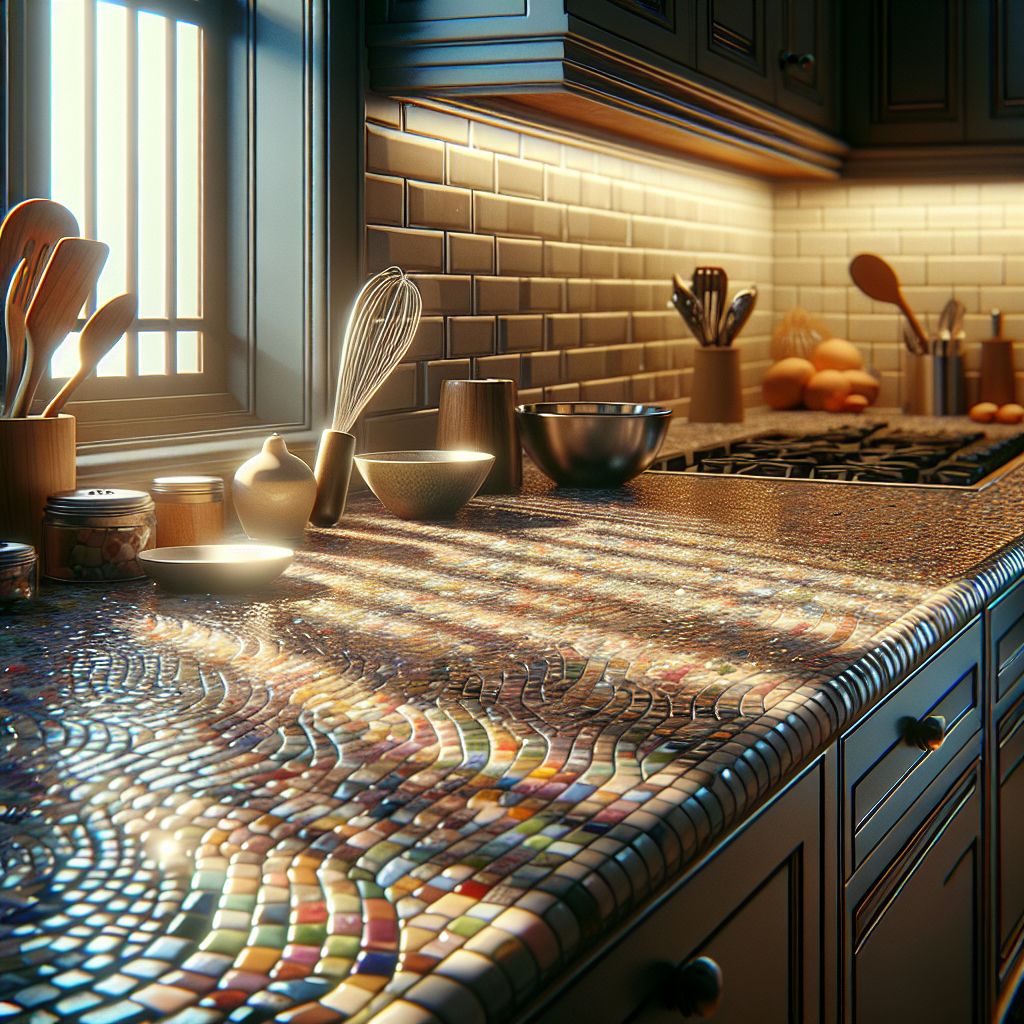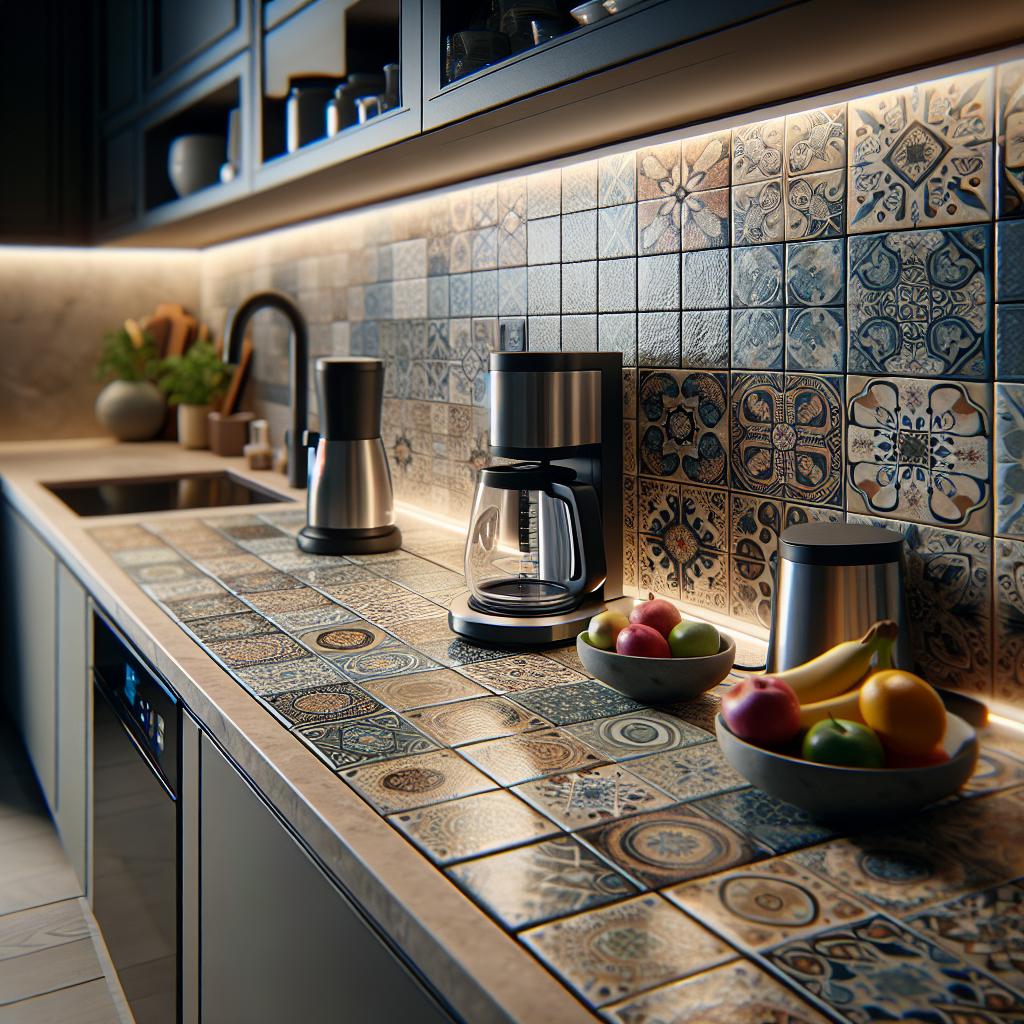
Key Takeaways
-
Refinishing tile countertops is a cost-effective way to update your kitchen without a full remodel.
-
Assessing the condition of your countertops is critical before deciding on refinishing or remodeling.
-
Setting clear renovation goals helps determine the scope and budget of your project.
-
Understanding the refinishing process is essential for a successful countertop makeover.
-
Remodeling your tile countertops allows for a complete style change and long-term satisfaction.
Breathing New Life into Your Kitchen: Refinish or Remodel?
The decision between refinishing and remodeling your kitchen countertops isn’t one to take lightly. It involves considering your budget, the current state of your countertops, and how much change you’re looking for. Both options have their merits, and the right choice will depend on your individual needs and desires.
The First Step: Assessing Your Tile Countertops’ Condition
Before you dive into the world of kitchen renovations, take a good look at your existing countertops. Are there cracks or chips in the tiles? Are the grout lines stained beyond redemption? Or perhaps the tiles are in good shape, but the color or pattern feels outdated. The condition of your countertops will be a significant factor in determining whether refinishing or a full remodel is the best path forward.
Setting Your Renovation Goals
Think about what you want to achieve with your renovation. Are you looking to sell your home soon and need to make quick, cost-effective updates? Or are you planning to create your dream kitchen, where every detail reflects your personal style? Setting your goals will guide you through the renovation process and help you allocate your budget effectively.
Comparing Pros and Cons: Refinishing vs. Remodeling Tile Kitchen Countertops
| Refinishing | Remodeling | |
| Cost | $200 to $500 depending on size and the materials used | $2000 to $5000 depending on size and the materials used |
| Timeline | A few days | Several weeks |
| Pros | Cost-effective, quick fix, less disruptive, eco-friendly, variety of finishes available | Enhanced aesthetics, increased durability |
| Cons | Limited resolution of underlying issues, potential decrease in durability | Time-consuming process, costly investment |
| Maintenance | Daily wiping with a soft cloth and a mild detergent, avoid abrasive cleaners | Follow the material-specific guidelines for cleaning and maintenance |

Tile Countertop Refinishing: A Budget-Friendly Facelift
If your tiles are in decent shape and you’re content with the layout of your kitchen, refinishing might be the ideal solution. It’s a process that can breathe new life into your space without the hefty price tag and extended downtime of a full remodel. Let’s explore what refinishing entails.
Understanding the Process of Refinishing
Refinishing tile countertops involves cleaning, repairing, and recoating the surface to make it look brand new. This can include fixing any chips or cracks, re-grouting if necessary, and applying a new surface coating. This coating can be in the form of specialized paint or a sealant, which can provide various finishes from matte to glossy, depending on your preference.
For example, using an epoxy coating can give your tile countertops a high-gloss finish that mimics the look of natural stone or quartz, at a fraction of the cost.
Refinishing is a great way to update the color of your countertops to match a new kitchen color scheme or simply to bring them into the current decade. It’s a project that can often be completed in a few days, minimizing the disruption to your daily life.
Benefits of Choosing to Refinish
Refinishing your tile countertops is more than just a quick fix; it’s a smart choice for those who want a fresh look without the full commitment of a remodel. Here are the benefits:
-
Cost-Effective: Refinishing can cost significantly less than replacing your entire countertops.
-
Time-Saving: A refinishing job can be done in a few days, whereas a remodel might take weeks.
-
Less Disruptive: You won’t have to completely clear out your kitchen for a refinishing project.
-
Eco-Friendly: By not tearing out the old countertops, you’re reducing waste.
-
Variety of Finishes: You can choose from a range of colors and textures to suit your style.
Downsides of Choosing to Refinish
-
Limited Resolution of Underlying Issues: Refinishing may not fully address problems like cracked tiles, uneven surfaces, or deteriorating grout.
-
Potential Decrease in Durability: The refinished surface may not be as durable as the original tile, leading to increased susceptibility to scratches, chips, and other damage, especially in high-traffic areas.

When to Consider a Full Remodel of Tile Countertops
While refinishing has its advantages, sometimes a full remodel is in order. If your countertops are severely damaged, or if you’re looking for a complete change in material and style, it’s time to think about starting from scratch.
Signs It’s Time to Remodel Your Countertops
If you’re facing any of these issues, remodeling might be the best choice:
-
Extensive damage that can’t be easily repaired
-
A desire to change the layout of your kitchen
-
Outdated tile that doesn’t fit with modern appliances and decor
-
A desire to increase home value with high-end materials
Choosing Materials for Your New Countertops
When you decide to remodel, you have the entire market of materials at your fingertips. From luxurious granite to sleek quartz, or even innovative recycled glass, the options are vast. Each material has its own set of benefits, aesthetics, and price points, so take your time to find the one that aligns with your vision and budget.
The Remodeling Timeline: Planning and Execution
Planning a remodel isn’t an overnight affair. Here’s a general timeline to help you set realistic expectations:
-
Design and planning: 2-4 weeks
-
Choosing and ordering materials: 1-6 weeks
-
Preparation and demolition: 1-2 weeks
-
Installation of new countertops: 1-2 weeks
-
Finishing touches and cleanup: 1 week
Remember, delays can happen, so it’s smart to factor in extra time.
Benefits of Choosing to Remodel
-
Enhanced Aesthetics: Remodeling tile kitchen countertops can completely transform the look of your kitchen, allowing you to choose modern designs, colors, and patterns that better suit your style preferences.
-
Increased Durability: Replacing old or damaged tiles with new ones during a remodeling project can improve the durability and longevity of your countertops, reducing the need for frequent repairs or maintenance.
Downsides of Choosing to Remodel
-
Costly Investment: Remodeling tile kitchen countertops can be expensive, especially if you opt for high-quality materials or intricate designs. The costs associated with purchasing materials, hiring professionals for installation, and potential disruptions to your daily routine should be considered.
-
Time-Consuming Process: A tile countertop remodeling project can take time to plan and execute, leading to disruptions in your kitchen’s functionality. Additionally, the removal of old tiles and installation of new ones may require several days or even weeks to complete, depending on the size and complexity of the project.

Comparative Analysis: Refinishing vs. Remodeling Costs
Now, let’s talk numbers. Refinishing your countertops can range from $200 to $500, depending on the size and materials used. On the other hand, remodeling can cost anywhere from $2,000 to $5,000, with high-end materials pushing that number even higher.
Estimating the Cost of Refinishing
To get a better idea of what refinishing might cost you, consider these factors:
-
The size of your countertops
-
The type of refinishing process you choose
-
Any repairs that need to be made before refinishing
Calculating the Investment for a Remodel
Remodeling costs can vary widely based on:
-
The material you select (granite, quartz, marble, etc.)
-
The complexity of the installation
-
Any additional modifications to your kitchen layout
Maximizing Your Return on Investment
Whether you refinish or remodel, think about the long-term benefits. A well-executed countertop renovation can yield a significant return on investment, especially if you’re planning to sell your home. Even if you’re not selling, the joy and satisfaction of a beautiful kitchen can be a priceless addition to your daily life.
Selecting the Right Contractor
Choosing the right contractor is like picking a partner for a dance. You need someone who can move in sync with your vision and budget. Start by asking for recommendations from friends or family who have recently undergone a countertop renovation. Check online reviews, and don’t hesitate to ask for references. Most importantly, ensure they are licensed and insured—this will protect you in case anything goes wrong during the project.
Maintaining Your Renovated Countertops
Once your tile countertops are either refinished or newly installed, proper care will keep them looking great for years to come. For refinished surfaces, avoid abrasive cleaners that can wear down the sealant. With new countertops, follow the material-specific guidelines for cleaning and maintenance. For example, granite may require periodic sealing, while quartz does not. Daily wiping with a soft cloth and a mild detergent is usually sufficient to maintain the countertop’s sheen and hygiene.
Understanding Warranties and Guarantees
Before you finalize your project, make sure you understand the warranties and guarantees that come with both the materials and the workmanship. A good warranty can offer peace of mind, ensuring that you’re covered if something doesn’t hold up as promised. Ask your contractor about the length of the warranty and what it covers. Remember, a company that stands behind its work is one that’s likely to deliver quality results.

Frequently Asked Questions
Can you refinish tile countertops or do they have to be replaced?
Yes, you can absolutely refinish tile countertops. This process can give them a new lease on life and is a fantastic option if the tiles are still in good condition but just need a style update or minor repairs. However, if the damage is extensive or you want a completely new look and material, replacement might be the way to go.
How long does it take to refinish tile countertops?
Refinishing tile countertops typically takes a few days, which is much quicker than a full remodel. The exact time will depend on the size of your kitchen and the extent of the work required. If it’s just a simple recoating, it could be done in a day or two. More extensive refinishing jobs might take a bit longer.
What type of materials can I consider for remodeling my countertops?
When remodeling your countertops, the world is your oyster when it comes to materials. You can choose from natural stone like granite or marble, engineered stones like quartz, sustainable options like recycled glass or bamboo, and even ultra-modern choices like stainless steel or concrete. Each material has its unique benefits and aesthetic appeal.
How much value does a kitchen countertop renovation add to my home?
A kitchen countertop renovation can significantly increase the value of your home, often yielding a return on investment of 60-80%. It’s one of the first things potential buyers notice, and a fresh, modern kitchen can be a major selling point. Even if you’re not looking to sell, a countertop renovation can enhance your enjoyment of your home.
Are there eco-friendly options for countertop refinishing or remodeling?
Yes, there are several eco-friendly options for both refinishing and remodeling your countertops. For refinishing, look for low-VOC or VOC-free sealants and coatings. When it comes to remodeling, consider materials like recycled glass, bamboo, or even salvaged wood. These options are not only better for the environment but can also add a unique, sustainable element to your kitchen design.



